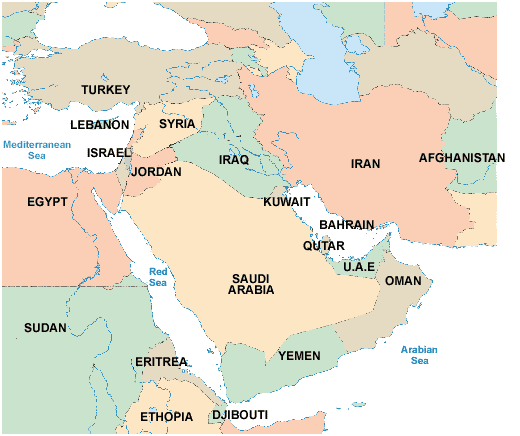A Two-for-One Deal: FISA and the Iraq/Afghanistan Wars
Posted by Unknown , Friday, February 15, 2008 8:37 AM
Below are two different posts combined. The first, which follows, is about FISA. I was going to write some huge entry on the Republican walkout in Congress yesterday, the reasons we should reject FISA (especially with telecom immunity), and the disappointing votes in the Senate that passed FISA with telecom immunity (that includes Senator Lincoln (D) of Arkansas - my senator). However, I found the following link at Scholars & Rogues, and every single word was taken out of my mouth.
The second post is something that I've already posted elsewhere. I want to submit it to you, the reader, and gather your opinion on the same topic.
I was addressing this question: I would like to ask how us maintaining stability in Iraq improves our national security?
Here is my answer, though I don't claim to know much more about the whole affair than the casual news-watcher. Just an educated guess, I s'pose.
Iraq alone? Not much. Most news and military reports say that al Qaeda has left Iraq in droves because of concentrated troops due to the surge, and local tribal leaders siding with the U.S. (which takes a source of recruits away).
However, the entire region is extremely volatile. Here's a map:

Iraq is surrounded by countries constantly plagued by violence and upheaval (as well as association with terrorism): Iran, Saudi Arabia, Syria, Jordan, and a hop (not a hop-skip-jump) from Israel and Palestine. Interestingly enough, you can see that our occupations of Afghanistan and Iraq have sandwiched Iran. It's not surprising as to why the Iranian president is more suited to make threats against the U.S. that can only seek to anger the American president and people. It's surrounded and feels the pinch.
But as far as an honorable exit from Iraq? Don't expect it. It's either going to be the John Edwards type withdrawal, where we pull the rug out beneath the Iraqi feet, or we take McCain's plan to stay there for however long it takes - even in the case that we'll never leave.
I think building democracy, as Bush claims we're trying to do, is a side-project. America wants the region stabilized so that it's productive. So what if it has democracy? There are plenty of other regions in the world that commit even worse atrocities (Burma? Darfur?). Invading Iraq and claiming the spread of democracy and the downfall of tyranny is suspiciously oblivious to goings on in the rest of the world (especially when we can't even admit our own successful bouts with genocide).
This brings up the upcoming, unavoidable, interesting, and terrifying concept of "peak oil." What it means for the world? When you reach peak oil, and every bit of it is being gobbled up by oil-hungry countries, and there's absolutely no where else to turn. You can't squeeze another million barrels out of an empty oil reservoir. Even if you could, it would probably be the last drops of oil we would ever receive from the reservoir - with or without new technology.
Peak oil means that what one nation gets, another nation goes without. Iraq is a good way to secure one of the more fertile oil nations in the Middle East as a supporter of America come peak oil time. You had better believe that the "we're not here for oil" rhetoric will disappear as fast as the gas prices rise.
So, back to [the original] question. How does this improve national security? In the short term, it really doesn't. It provides us with a rather unstable foothold in a completely unfamiliar land with unfamiliar customs that are incompatible with democracy and freedom and individualism. We've managed to piss off every country and have - wittingly or unwittingly - made them fear 21st century imperialism. But, on the other hand, we've quite possibly secured America can survive past peak oil, buying us enough time to switch to other fuel sources.
Iraq can't keep American's oil addiction forever, but it can buy us enough years to completely transform our economy.
Does that mean I support the war? I don't and I never did. But I can see the long term implications of our being there, and I find it hard to make a case for us to get out immediately - whether it's because of the backlash of violence that will surely come if we leave (and the massacres of thousands of people), or the coming of peak oil. The debt is the only huge reason I think we should come up with long-term plans for a war that we didn't plan to be long-term.
Dear reader-who-I-hope-is-still-reading, what do you think?





Fantastic! You're tagged.